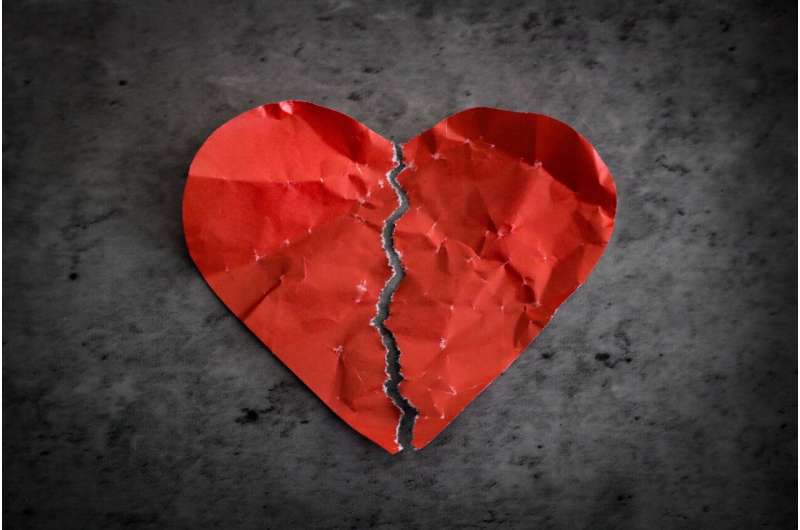This article has been reviewed according to Science X's editorial process and policies. Editors have highlighted the following attributes while ensuring the content's credibility:
fact-checked
trusted source
written by researcher(s)
proofread
Romance isn't always rosy, sometimes it's sickening—lovesickness, erotomania and death by heartbreak explained

Absence makes the heart grow fonder. All you need is love. It's better to have loved and lost than never to have loved at all.
If cliches and pop songs are anything to go by, humans spend a substantial portion of waking and sleeping hours thinking and dreaming about the pursuit of love—in all its many forms.
But is love all pink hearts, roses and teddy bears—or is there a darker side? Can love, or the absence of love, generate a form of sickness? Can it even lead to lasting physical or mental illness? And is it possible to die of a broken heart?
Pathological Love
Love can hurt. Ian McEwan framed a pathological form of affection, leading to obsession in his 1997 novel "Enduring Love". The central character, Joe, is stalked and harassed by the mentally unwell Jed, following a tragic accident that unites them both.
The condition that McEwan explores so vividly is erotomania, which was described by de Clerembault in 1942, and the syndrome still bears his name today. It describes the delusional but unwavering belief of being secretly but nonetheless intensely loved by another person.
De Clerembault was not the first person to notice these symptoms. They appear even in the words of Hippocrates, described as a form of unrequited love. The condition has seen a renaissance, over the past three centuries, shifting from unanswered love to sex addiction, to its current standing of delusions of love.
There are many true life examples of erotomania documented in the press. Like in "Enduring Love", the condition can have murderous undertones. In 1981, John Hinckley Jr was arrested and institutionalized for attempting to assassinate US president Ronald Reagan. His motive? An attempt to impress the actress Jodie Foster, with whom he had become obsessed.
I love Paris in the springtime
Love, or perceptions of love for material objects or places rather than individuals might also be enough to trigger psychiatric illness.
Take the observations of Stendhal, the pseudonym of 19th century Frenchman Marie-Henri Beyle. Stendhal was not a psychiatrist, but a writer, who found himself overcome by the beauty of Florence when traveling there in 1817. Both art and architecture—such as the statue of Michaelangelo's David or the Basilica of Santa Croce—were overwhelming enough to induce dizziness, palpitations, even fainting episodes in both Stendhal and in many other Florentine tourists since. A resident psychiatrist recounted many observations of the cluster of symptoms during her time at the local hospital.
Stendhal syndrome lacks the evidence to be classified formally as a disease—but visits to other cities can also induce similar symptoms. Anyone who seen depictions of Paris in film and fiction, as a city dripping with romance, fantasy and allure, often form a detailed and exciting image of it in their mind.
For many tourists, Paris lives up to these expectations, and more. For others, unfortunately not—leading to a condition known as Paris Syndrome. Realizing that the city and its residents don't conform to their preconceived ideas can prove too great a disappointment for some, who can suffer from a severe form of culture shock; sweating, racing heart, nausea and vomiting, even hallucinations may ensue.
Too many broken hearts in the world
For centuries, romance novels have included the trope of the tragic brokenhearted character, wasting away because of lost love—but is there science to back up this claim?
Well, yes. The term broken heart syndrome applies to a genuine cardiac condition—Takotsubo cardiomyopathy. This rare condition can generate patterns of acute heart failure, appearing in signs and symptoms, and even in blood tests and ECG (or electrocardiogram—the electrical tracing of cardiac function) to be a myocardial infarction, or heart attack.
Takotsubo, in case you were wondering, is a specialized Japanese fishing pot used to fish for octopus, to which the ballooned and dysfunctional heart bears a close resemblance.
The underlying cause of broken heart syndrome? Severe stress—from the emotional upheaval of a relationship break up, or death of a loved one. It is an example of how psychologically driven stress can impact upon the body physically. The biological response which helps our bodies to respond to stressors causes the release of catecholamine hormones—among them, adrenaline. The raised levels of adrenaline have been proposed as an underlying cause of broken heart syndrome—a link between heart and mind—though more research is required to tell for sure.
The good news is that broken heart syndrome is treatable, using the same medications as are used for a heart attack, and in the vast majority of cases is a reversible phenomenon.
Love really is all around, and has more consequences for health and well-being than you might think. The brain and heart are inextricably linked, and conditions of each give us insight into the complexity of love and its effect on our bodies and minds.
This article is republished from The Conversation under a Creative Commons license. Read the original article.![]()




















